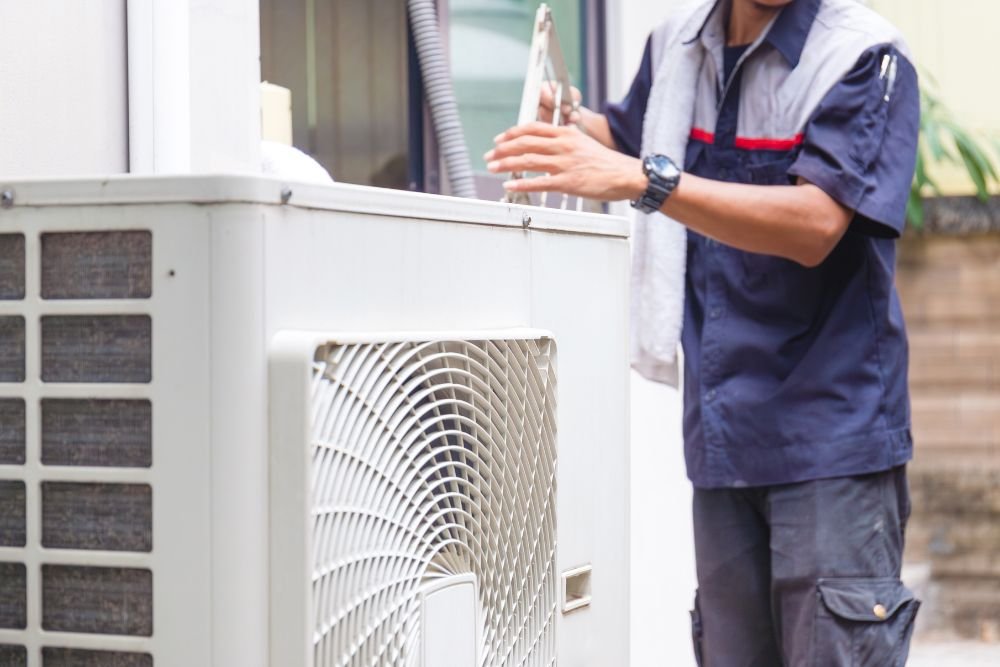Is Your AC A Dying Gasp?
Is Your AC A Dying Gasp?
Blog Article

Sweltering summers and icy winters are no match for your trusty air conditioner... until it isn't. Before you resign yourself to sleepless nights, pay attention to these five indicators that your AC might be on its last legs.
- Recurring issues: If you're constantly calling a technician, it might be time to replace your aging AC.
- Low airflow: Is your AC struggling to keep up? a noticeable decrease in cooling power|a constantly running unit without proper results could indicate a failing system.
- Strange noises: Grinding, screeching, or clanging coming from your AC unit aren't normal. they can be early warning signs of impending failure
- Soaring utility costs: A failing AC works harder and uses more energy, resulting in higher bills. If your energy costs have skyrocketed, it's worth investigating.
- Years of service: Even with regular maintenance, air conditioners have a limited lifespan. If yours is over 15 years old, it's highly likely that replacement is on the horizon.
Ignoring these signs could lead to a complete system failure during those critical summer or Signs You Need To Replace Your HVAC System winter months. Replacing your AC before it completely quits can save you time, money, and stress in the long run.
HVAC Woes: When Repairs Mean Replacing Your Whole System Replacing
Dealing with a persistently problematic HVAC system can be frustrating and costly. While minor repairs might seem like the most sensible solution initially, there are instances where investing in a complete replacement becomes more beneficial than continually patching up an aging unit.
- If your system is ancient and constantly requiring major repairs, it's a clear clue that its life span is nearing its end.
- When the cost of troubleshooting consistently climbs a significant percentage of a new system's price, it's time to evaluate your options.
- Technological advancements in HVAC systems have led to remarkable improvements in energy efficiency and performance. A new system can dramatically decrease your energy bills.
Ultimately, the decision to replace your HVAC system is a complex one that involves considering factors such as age, repair history, cost of repairs versus replacement, and energy efficiency. Consulting with a qualified HVAC specialist can provide valuable insights and guidance to help you make an informed choice.
Are Blowing Hot Air? Warning Signs Your HVAC Needs an Upgrade
Feeling like your heating/cooling/HVAC system is working overtime but not really keeping up? Your home might be putting out some subtle indicators that it's time for a fresh/new/updated HVAC installation. A noticeable increase in your energy bills could point to an inefficient/overworked/tired system. If you're constantly adjusting/tweaking/ fiddling with the thermostat and still not finding comfort, it might be a sign that your HVAC needs some love. A strange/unusual/odd smell coming from your vents could also point to a problem demanding attention.
- Tune into for grinding/clunking/rattling noises from your HVAC unit.
- Constant/Regular breakdowns or malfunctions can signal a failing system.
- If the air coming from your vents feels weak/dull/less effective, it could be a sign that your unit is struggling to circulate/distribute/push air effectively.
Don't ignore these warning signs. Addressing HVAC problems early can avoid more serious and expensive/costly/pricey repairs down the road. A properly functioning HVAC system is essential for a comfortable and healthy/safe/well-maintained home environment.
Wasting Money Away! 6 Clues Your HVAC is Finished
Is your heating system acting up? Don't ignore the signs that it's approaching its end. A failing HVAC unit can deplete you a fortune in upgrades. Here are 6 obvious signs that your HVAC system needs serious attention:
- Your energy bills are increasing dramatically.
- Recurring breakdowns and glitches.
- You're frequently adjusting the thermostat to find a comfortable temperature.
- Your home feels unevenly heated or cooled.
- Strange noises coming from your HVAC unit.
- Your air conditioner is blowing warm air, even on the coldest setting.
When Temperatures Rise and Your AC Chokes
Dealing with a broken air conditioner can make a comfortable home into a sweltering sauna. Frommere refrigerant leak to shot compressor, there are a myriad of reasons why your AC might suddenly choose not to work. While a DIY approach might seem tempting for minor problems, sometimes it's best to callenlist the experts.
- Consider these some signs that you need to get in touch with a professional AC technician:
Whenever your AC unit produces a funky racket, it's time to take a closer look. Strange sounds could indicate be indicative of a loose part to a serious malfunction..
- If your energy bills increase dramatically, it's possible your AC is working overtime, wasting energy. A professional can pinpoint the source of the issue
{Remember,Keep this in mind: Ignoring a problematic AC unit can lead to bigger, more costly repairs down the line. By calling in the experts when you notice warning signs, you can stay ahead of major headaches and guarantee that your home stays cool and comfortable all summer long.
Signs Your HVAC Needs an Upgrade
Your home's heating, ventilation, and air conditioning (HVAC) system is responsible for your comfort year-round. Yet, just like any complex machine, it naturally loses efficiency over time. As your HVAC ages, you might start noticing signs of decline. These can include higher energy bills, inconsistent heating and cooling, constant maintenance needs, and even stale air coming from the vents. If you're experiencing any of these red flags, it might be time to consider replacing your aging HVAC system.
- Be on the lookout for these signs:
- Increased utility costs
- Uneven climate regulation
- Frequent repairs
- Stale air coming from the vents
Remember, a efficiently running HVAC system not only keeps you comfortable but also contributes to lower energy usage. Investing in your HVAC system can be a worthwhile investment that saves money in the long run.
Report this page